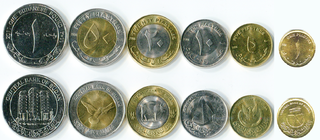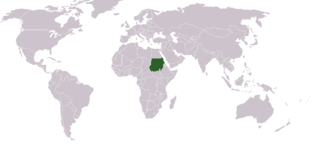See also
Years in Africa | |
|---|---|
| Sovereign states |
|
States with limited recognition | |
Dependencies and other territories |
|
This is a list of years in South Sudan . See also the timeline of South Sudanese history. For only articles about years in South Sudan that have been written, see Category:Years in South Sudan.

Sudan, officially the Republic of the Sudan, is a country in Northeast Africa. It borders the Central African Republic to the southwest, Chad to the west, Egypt to the north, Eritrea to the northeast, Ethiopia to the southeast, Libya to the northwest, South Sudan to the south, and the Red Sea. It has a population of 45.7 million people as of 2022 and occupies 1,886,068 square kilometres, making it Africa's third-largest country by area and the third-largest by area in the Arab League. It was the largest country by area in Africa and the Arab League until the secession of South Sudan in 2011; since then both titles have been held by Algeria. Its capital and most populous city is Khartoum.

The demographics of Sudan include the Sudanese people and their characteristics, Sudan, including population density, ethnicity, education level, health, economic status, religious affiliations, and other aspects of the population.

The foreign relations of Sudan are generally in line with the Muslim Arab world, but are also based on Sudan's economic ties with the People's Republic of China and Russia.
This page provides an index of articles on rail transport by country.
The Eastern Nilotic languages are one of the three primary branches of the Nilotic languages, themselves belonging to the Eastern Sudanic subfamily of Nilo-Saharan; they are believed to have begun to diverge about 3,000 years ago, and have spread southwards from an original home in Equatoria in South Sudan. They are spoken across a large area in East Africa, ranging from Equatoria to the highlands of Tanzania. Their speakers are mostly cattle herders living in semi-arid or arid plains.

The United Nations Mission in the Sudan (UNMIS) was established by the UN Security Council under Resolution 1590 of 24 March 2005, in response to the signing of the Comprehensive Peace Agreement between the government of the Sudan and the Sudan People's Liberation Movement on January 9, 2005, in Sudan.

The Sudanese pound is the currency of the Republic of the Sudan. The pound is divided into 100 piastres. It is issued by the Central Bank of Sudan.
The Province of the Episcopal Church of South Sudan, formerly known as the Episcopal Church of Sudan, is a province of the Anglican Communion located in South Sudan. The province consists of eight Internal Provinces and 61 dioceses. The current archbishop and primate is Justin Badi Arama. It received the current naming after the inception of the Province of the Episcopal Church of Sudan, on 30 July 2017.
This is a timeline of Sudanese history, comprising important legal and territorial changes and political events in Sudan and its predecessor states. To read about the background to these events, see History of Sudan. See that the [[list of governors of pre-independence list of heads of state of Sudan.

Sudan–United States relations are the bilateral relations between Sudan and the United States. The United States government has been critical of Sudan's human rights record and has dispatched a strong UN Peacekeeping force to Darfur. Relations between both countries in recent years have greatly improved, with Sudan's post-revolutionary government compensating American victims of al-Qaeda terror attacks, the removal of Sudan from the State Department's blacklist of state sponsors of terrorism and the United States Congress having reinstated Sudan's sovereign immunity in December 2020.

The following outline is provided as an overview of and topical guide to Sudan:

The States of South Sudan were created out of the three historic former provinces of Bahr el Ghazal (northwest), Equatoria (southern), and Greater Upper Nile (northeast). The states are further divided into 79 counties.

The South Sudan national football team represents South Sudan in international football and is controlled by the South Sudan Football Association, the governing body for football in South Sudan.

South Sudan, officially the Republic of South Sudan, is a landlocked country in eastern Central Africa. It is bordered by Ethiopia, Sudan, the Central African Republic, the Democratic Republic of the Congo, Uganda, and Kenya, and includes the vast swamp region of the Sudd, formed by the White Nile and known locally as the Bahr al Jabal, meaning "Mountain Sea". The population was 11,088,796 in 2023, and Juba is the capital and largest city. South Sudan gained independence from Sudan on 9 July 2011, making it the most recent sovereign state or country with widespread recognition as of 2024.

The Republic of South Sudan became independent on 9 July 2011 from Sudan and issued its first stamps on 13 July 2011. Only almost three months later, on 4 October 2011, did South Sudan become a member of the Universal Postal Union (UPU). Before independence, South Sudan used stamps issued by Sudan. The Directorate of Postal Services of the Ministry of Telecommunication and Postal Services is responsible for postal affairs in South Sudan.
The post conflict South Sudan has huge challenges in delivering health care to the population. The challenges include: crippled health infrastructures, nearly collapsed public health system, and inadequate qualified health professionals. The country is far from achieving the MDGs by end of 2015. The health system needs a major resuscitation, in addition to supporting and developing health training institutions.